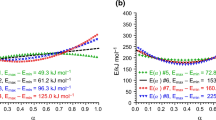Abstract
The criticisms raised by J. Zsakó concerning an earlier paper by this author [J. Thermal Anal. 9 (1975) 101] are in turn examined. The lack of physical significance ofn, E, andZ for thermal decompositions is recognized by both authors. The disagreement lies in the value of using these parameters when the complete rate equation is not known.
When a calculated set of parameters does show an apparent kinetic compensation effect, the most probable cause is an irreversible rate limiting process which requires some minimum temperature for initiation of bond breaking.
Résumé
Réponse aux critiques formulées par J. Zsakó sur un précédent mémoire de l'auteur (J. Thermal Anal., 9 (1975) 101). Les deux auteurs s'accordent pour reconnaître le manque de signification physique den, E etZ dans le cas des décompositions thermiques. Le désaccord porte sur la valeur de l'utilisation de ces paramètres lorsque l'équation complète de la vitesse n'est pas connue.
Lorsqu'un groupe de paramètres calculés montre un effet de compensation cinétique apparente, la cause la plus probable en est un processus irréversible limitant la vitesse auquel correspond une température minimale nécessaire pour amorcer la rupture des liaisons.
Zusammenfassung
Die kritischen Bemerkungen von J. Zsakó zu einem früheren Artikel des Autors [J. Thermal Anal., 9 (1975) 101] werden der Reihe nach geprüft. Beide Autoren stimmen überein, dassn, E undZ für thermische Zersetzungen keine physikalische Bedeutung haben. Die Meinungsverschiedenheit besteht darin, dass der Wert des Einsatzes dieser Parameter umstritten wird, wenn die vollständige Geschwindigkeitsgleichung nicht bekannt ist.
Wenn ein berechneter Satz von Parametern einen scheinbaren kinetischen Kompensationseffekt zeigt, ist der wahrscheinlichste Grund hierfür ein irreversibler geschwindigkeitsbegrenzender Vorgang, der zur Initiierung des Lösens von Bindungen einer gewissen Minimaltemperatur bedarf.
Резюме
Вновь исследованы кр итические замечания Я. Жако, касающиеся боле е ранней статьи автора (J. Thermal Anal., 9 (1975) 101). От сутствие физическог о смысла для
n, E иZ в случае термичес ких разложений, устан овлено обеими авторами. Разн огласие возникает в значении использования этих п араметров, когда полное уравнен ие скорости реакции неизвестно. К огда вычисленный ряд параметров показывает кажущийс я кинетический компенсационный эфф ект, наиболее вероятн ой причиной этого является необр атимая скорость ограничива ющего процесса, котор ый требует некоторого минимума температуры для стимулирования р азрушения связи.
Similar content being viewed by others
References
P. D. Garn, J. Thermal Anal., 7 (1975) 475.
P. D. Garn, Proc. IV. ICTA, Akadémiai Kiadó, Budapest 1975, Vol. 1, p. 25.
J.Zsakó, J. Thermal Anal., In Press (1975).
J. Zsakó, J. Thermal Anal., 5 (1973) 239.
P. D. Garn, Critical Reviews in Analytical Chemistry, 4 (1972) 65.
P. D. Garn, Proceedings of 2nd Nordic Symposium, pp. 31–43, Risø, Denmark, Sept., 1973. NORDFORSK Huvudsekretariat, Stockholm, Sweden.
P. D. Garn, andJ. E. Kessler, Anal. Chem., 32 (1960) 1563.
P. D. Garn, Thermoanalytical Methods of Investigation, Academic Press, New York 1965.
Author information
Authors and Affiliations
Additional information
The author is grateful to the U. S. National Science Foundation for support of this work.
Rights and permissions
About this article
Cite this article
Garn, P.D. The kinetic compensation effect. Journal of Thermal Analysis 10, 99–102 (1976). https://doi.org/10.1007/BF02179195
Received:
Issue Date:
DOI: https://doi.org/10.1007/BF02179195




